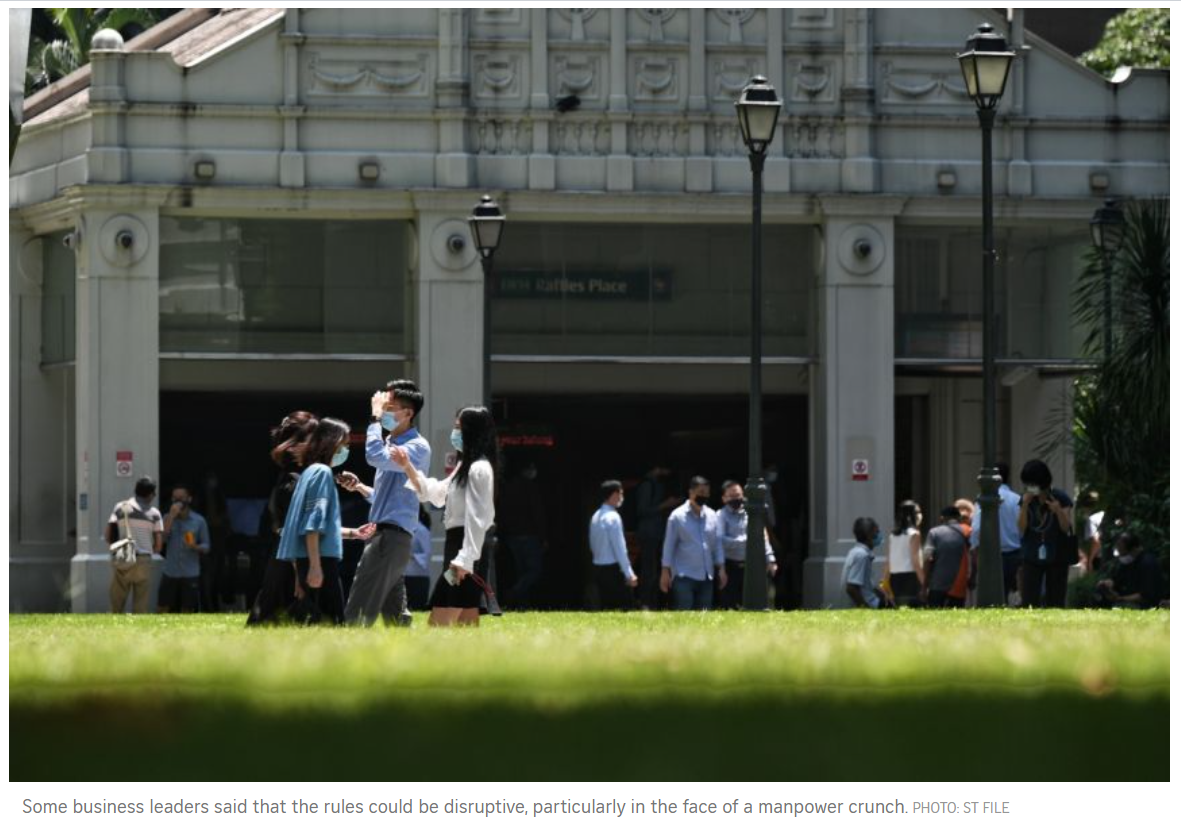Singapore’s new Covid-19 workplace rules challenging, say business leaders
SINGAPORE – Business leaders have expressed concerns over the new Covid-19 workplace management rules which, they say, could impact operations if fresh infections force their staff to work from home.
Some said that the rules could be disruptive, particularly in the face of a manpower crunch.
On Tuesday, the Ministry of Manpower issued an updated advisory on workplace management to curb the spread of Covid-19. Under the new guidelines, companies must implement a snap 14-day work-from-home (WFH) regimen if an employee tests positive for Covid-19 and was at the workplace in the last seven days. There will also be regular testing for staff who work onsite.
While these new measures are needed to stem the rise of community cases, they will also take a toll on businesses, experts said.
Singapore National Employers’ Federation executive director Sim Gim Guan said: “The need to implement a snap 14-day WFH arrangement can be quite challenging because that is going to require a lot of communication, and could also be disruptive. So, companies and employees alike need to be a lot more agile and resilient.”
Chipmakers are feeling the heat, said Mr Ang Wee Seng, Singapore Semiconductor Industry Association’s executive director.
“The industry is already facing a manpower crunch due to the shutting down of borders and expansion of many companies. This will definitely (add) further pressure. Companies will need to manage their work hours carefully so as to mitigate the risk of a wide outbreak within the company.”
However, companies can continue split-team arrangements. For instance, if someone from Team A is infected and the team has to work from home, those who are from Team B and need to work on site may do so.
Randstad Singapore managing director Jaya Dass added: “Business leaders need to create an internal taskforce to revise or create new standard operating procedures and communicate them transparently to the workforce.”
Meanwhile, Singapore Manufacturing Federation president Douglas Foo said manufacturing firms are adapting and remaining resilient despite challenges.
“The business continuity plans that companies have put in place in the factories such as split teams and staggered working hours have helped ensure operations continue moving even with manpower constraints,” he said, adding that automation and Industry 4.0 technologies have also lightened the load on the workforce.
A spokesman for the Public Service Division said the public service will align its guidelines to be in tandem with the latest workplace safe management measures.
He added that it is working towards greater work flexibility, with hybrid work becoming more common where possible.
“We leverage on teleconferencing to ensure business continuity and safe management,” he said.
Mr Devadas K, chief executive of management consultancy firm Future-Moves Group, said that the snap 14-day WFH requirement is an understandable precaution, though in the longer term, such a requirement could be disruptive and a cause of frustration to businesses.
But after a year of the pandemic, FastJobs general manager Lim Huishan noted that many firms should already have WFH arrangements in place, so they just have to activate the plans when needed.
Mr Kurt Wee, president of the Association of Small and Medium Enterprises, added that ultimately, firms just want to get through the crisis in a sustainable manner, rather than triggering a lockdown.
Mr Yap Shih Chia, executive vice-president of corporate development, strategy and new businesses at environmental services firm Chye Thiam Maintenance, said: “We are confident that we can apply the new guidelines for our corporate services. But for the project sites where workers are deployed, this is something that still needed to be reviewed.”
He added that work-from-home is not an option for his front-line essential staff.
Meanwhile, most staff at Prudential Singapore are still working from home, and they have the equipment needed to connect remotely. This means they can easily transition to a snap work-from-home arrangement, the firm said.
Singapore Business Federation chief executive Lam Yi Young noted: “Notwithstanding, businesses should review their contingency plans to ensure they are ready to implement the snap work-from-home arrangement once required, including how to communicate with employees.”
Source: https://www.straitstimes.com/singapore/new-covid-19-workplace-rules-challenging-say-firms


 English
English




